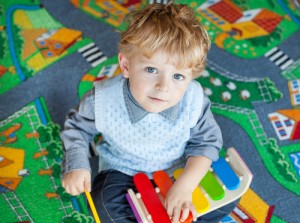 As parents, we want to give our children the very best start in life. From healthcare and safety to learning and development, parents are always looking for the best way to help young children develop into intelligent, happy young people and adults.
As parents, we want to give our children the very best start in life. From healthcare and safety to learning and development, parents are always looking for the best way to help young children develop into intelligent, happy young people and adults.
Music offers a great tool for bolstering children’s development, comfort and confidence. Studies have shown that even while babies are still in the womb, playing music to them can have a positive impact on them later in life. Music is present in all cultures and corners of the world, and for good reason. It also forms a regular part of our days at our nurseries (Pear Tree in North Camp, Pebbles in Farnborough and Pirbright Day Nursery). Here we highlight just a few of the benefits music can have on child development throughout their young lives.
The Developmental Benefits Of Music
When children are engaged by music of any form and colour, there can be a whole host of benefits for their development. In particular, research has shown music will support:
Literacy: Early literacy requires a deep familiarity with the way English language is spoken, the rhythm of words and how they mesh together. Listening to songs and nursery rhymes during their early years will support comprehension skills that are the foundation of reading and writing.
Physical development: Moving and dancing, performing actions to songs and playing simple instruments all supports the development of motor skills in young children. Coordination, fine and gross motor control and balance can all be enhanced when music is used in play.
Creativity: When we are able to provide a safe and fun environment where a child is encouraged to express themselves freely, their creativity and imagination can be sparked, helping build those neural pathways that will stay with them for life.
Social and emotional development: When they get together for a sing-song, or join in a dance with other children and adults, our children are learning valuable self-control, essential for readiness for school. They learn to interact with others in a healthy, appropriate way, helping to build friendships and social skills for life.
Reasoning: Because music follows patterns, children will be developing elements of reasoning, logic and repetition, all of which will support later development of maths, science and engineering skills.
Most important of all, when we take the time to expose young children to different types and styles of songs and instruments, we’re encouraging a lifelong love of music that they’ll be able to enjoy forever.
What Can You Do At Home?
Toddlers and pre-schoolers simply love to sing. Whether they can hold a tune or not doesn’t matter to them at all. They simply enjoy singing for singing’s sake. At this age, they have not yet become self-conscious about how they sound or what other people think, so this is a great age at which we can help them express themselves, learn and grow with music in the home.
Music with repetitive lyrics and beats are great for the younger listener. They’ll quickly pick up the words to simple nursery rhymes, and will particularly enjoy music that has actions to go with it. Songs like ‘wind the bobbin up’; ‘wheels on the bus’; and ‘incy wincy spider’ are all great for younger children, as they’ll improve their self-control and coordination through learning the actions.
Not all music at home has to be children’s music though. Classical music has been shown to improve mathematical abilities, and even pop music with its foot tapping beats can be a great influence to inspire expression and creativity. Music in all its shapes and forms can have a profoundly positive effect on your little one, so turn up the volume and enjoy!
